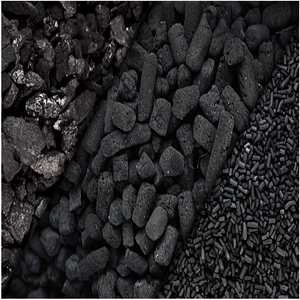Advanced Insights into Activated Carbon Production Technology
Activated carbon production is a precision-driven sequence of processes that converts organic feedstocks into highly porous adsorbents, where every operational parameter directly impacts the material’s adsorption efficiency and industrial applicability. This technology has evolved significantly to meet diverse demands, from water treatment to air purification, with continuous innovations focusing on sustainability and performance optimization.
Raw Material Selection and Preprocessing: The Foundation of QualityThe journey begins with strategic raw material selection, as feedstock properties dictate the final product’s characteristics. Coconut shells remain a premium choice due to their high fixed carbon content (over 75%), low ash levels (less than 3%), and natural fiber structure, which facilitates pore formation—making them ideal for high-end applications like pharmaceutical toxin removal. Coal, particularly bituminous and anthracite varieties, is preferred for large-scale industrial production thanks to its stable composition and cost-effectiveness, while wood-based feedstocks (e.g., pine, oak) are favored for eco-friendly markets due to their renewable nature. Post-selection, preprocessing is critical: raw materials are crushed into 2–5mm particles to ensure uniform heat distribution, then dried in rotary kilns at 120–150°C to reduce moisture content below 10%. This step minimizes energy consumption during subsequent heating and prevents uneven carbonization.
Core Processes: Carbonization and Activation
Carbonization is the first transformative step, conducted in oxygen-deficient rotary furnaces or vertical retorts at 400–600°C. Here, volatile components (e.g., water, tar, and organic acids) are driven off, accounting for 50–70% weight loss, while a rigid carbon skeleton is formed. However, this skeleton has minimal porosity—typically less than 100 m²/g—requiring activation to unlock the material’s adsorptive potential.
Two dominant activation methods are employed industrially. Physical activation (or gas activation) involves treating the carbonized material with oxidizing gases (steam, CO₂, or air) at 800–1000°C. The gas reacts with the carbon surface, etching micro-pores (≤2nm) and meso-pores (2–50nm) that create a surface area exceeding 1,500 m²/g. This method is favored for food-grade and pharmaceutical activated carbon due to its chemical-free nature. Chemical activation, by contrast, mixes raw materials with dehydrating agents (ZnCl₂, H₃PO₄, or KOH) before carbonization. The chemicals lower the activation temperature to 400–600°C and promote uniform pore size distribution, making it suitable for specialized applications like VOC adsorption. However, this method requires rigorous washing with water or acids to remove residual chemicals, adding complexity to the process

Post-Treatment and Sustainable Innovations
After activation, the product undergoes crushing, sieving (to achieve particle sizes ranging from 0.5mm to 5mm), and drying to meet industry standards. Modern production lines are integrating sustainability measures: waste heat from carbonization furnaces is recycled to power dryers, while chemical activation byproducts (e.g., diluted acids) are neutralized and reused. Additionally, research into biomass feedstocks—such as agricultural wastes (rice husks, sugarcane bagasse)—is reducing reliance on non-renewable coal and enhancing the technology’s environmental footprint.
In summary, activated carbon production technology balances precision engineering with adaptability, enabling it to serve critical roles in environmental protection and industrial processes. As demand for clean water and air grows, advancements in feedstock diversification and green manufacturing will further solidify its importance.
We are the main supplier in China, for price or more information welcome to contact with us at:
Email: sales@hbmedipharm.com
Telephone:0086-311-86136561
Post time: Nov-13-2025

